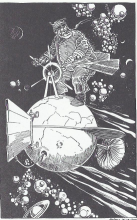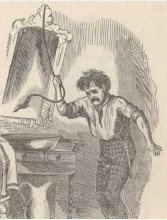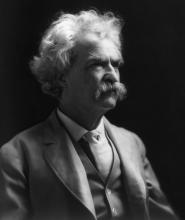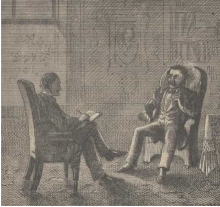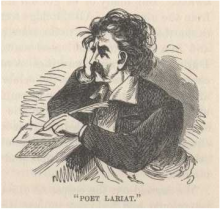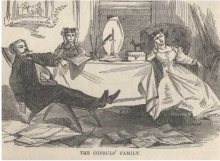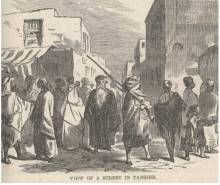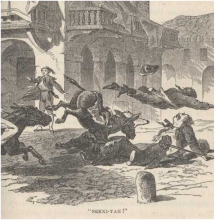Capt. Stormfield died and it took him thirty years to reach heaven, racing along like a comet. Indeed racing other comets. Finally arriving at the wrong door, his planet of origin is unknown. The clerk eventually identifies where the good captain should be, a million leagues away. He goes to the red wishing-carpet and instantly arrives at the proper gate. What follows is the destruction of every belief the captain had about heaven and a new perspective on humanity's place in the universe.
This chapter is important in terms of Twain's dealing with culture shock and his early perception of what was at one time referred to as "the Ugly American". Of particular interest is Twain's description of the dungeons of the heroes of Dumas. On a lighter side is a description of dining in France and the friendship between and elephant and a cat.
Letters From the Earth was composed over a long period of time, from his first travels overseas in the Holy Land, as reported in The Innocents Abroad, to within six months of his death. The material was edited by Bernard DeVoto in 1939 but was not actually published until 1962 when his daughter Clara gave permission to do so. The version I (or SLClemens) read was published on http://www.positiveatheism.org/hist/twainlfe.htm
Initially I thought this was just a humorous sketch but then I found some interesting connections with the current OWS (Occupy Wall Street) movement. This was first published the Buffalo Express, of which Mark Twain was a part owner. It was published again in the Internal Revenue Record of Customs Journal, April 9, 1870 (according to www.twainquotes.com/19610409.html)
This chapter is apparently not a product of any letter posted to the Daily Alta California. It covers the celebration of the 4th of July on board the Quaker City, landing in Marseilles and his first dinner in France. They were rather disappointed in that their hostess spoke English. Of special interest is speculation by The Oracle on atmospheric physics and his dislike of poetry.
An interesting chapter of Twains impressions of Moorish customs. This was originally published as Letter Number Four in the Daily Alta California on September 1, 1867. An image of this column is provided on this page. McKeithan (1958) remarks that "Twain tried to improve the diction" of the original letter for the text here in chapter 9 of the book. Here we have a discussion of various means of exacting punishment employed by the Moors.
I've heard (or read) that the human mind can be described as a hologram. If I recall correctly, and I haven't done any research on this, a hologram can be cut up into pieces and each piece will contain the entire image, a bit degraded depending on just how small the piece is. Again, I'm thinking of my mothers dementia (and I still haven't gotten to sleep (it's after 3am now)). Imagine the human mind is a four dimensional hologram and this hologram gets shattered. It doesn't fall apart but all the pieces are now free to move about. What kind of image can be seen in such a mind.
Twain wanted to find a land totally foreign to his experience. He found that in Tangier. McKeithan (1958) remarks that this letter is used in the book almost entirely as originally written.
Along with Chapter 5, this chapter describes Twain's visit to the Azores. Attached is an image from the first letter of the journey to the Daily Alta California. A note in Traveling with the Innocents Abroad by Daniel Morley McKeithan, mentions this was published August 2, 1867. The masthead of the image copy I have has the date as August 25.
Subscribe to
© 2025 B Scott Holmes, All rights reserved.
